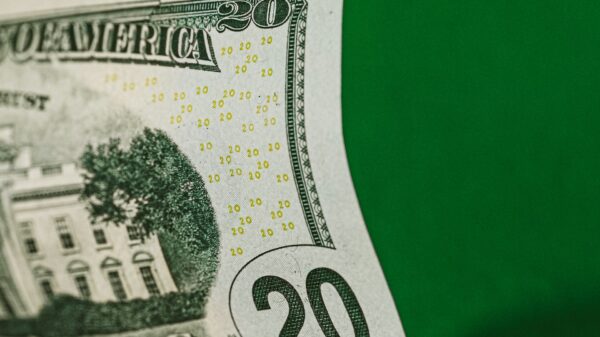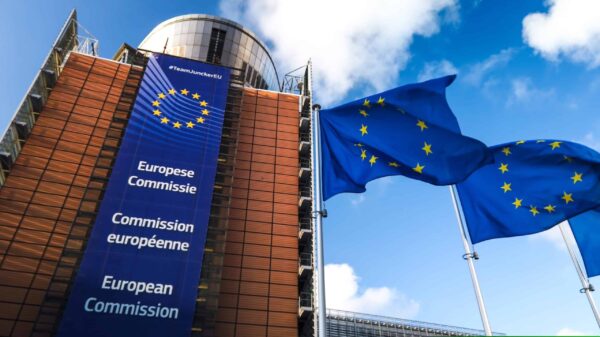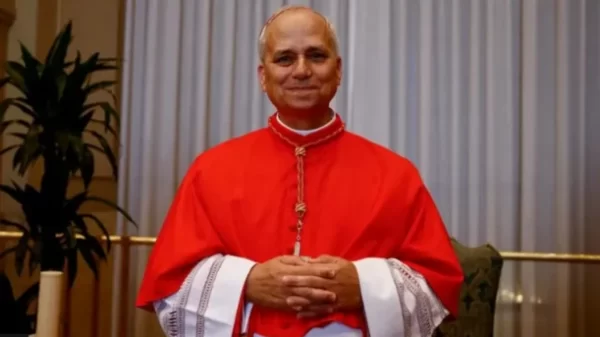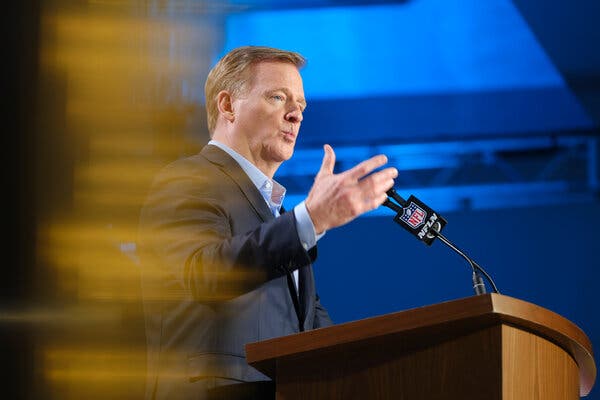At a Super Bowl halftime show rehearsal in 2020, a top male N.F.L. executive argued with a woman who said that he then pushed her. After investigating, the league removed the man from his longtime role overseeing the show and ordered him to take an anger management course. But he remains a senior executive.
Exactly what happened between the woman, who was involved in the production of the show, and the man, Mark Quenzel, the N.F.L.’s senior vice president and head of content, remains in dispute, and the league insists he did not push her.
Yet the incident was one of many raised by more than 30 women who spoke to The New York Times about their experiences working for the N.F.L. as recently as 2021. They described a stifling, deeply ingrained corporate culture that demoralized some female employees, drove some to quit in frustration and left many feeling brushed aside.
The women said this culture has persisted despite a promise from N.F.L. Commissioner Roger Goodell — made after the 2014 release of a video that showed running back Ray Rice punching his fiancée unconscious — that the league would take a stricter stance on domestic violence and sexual assault and hire more female executives.
The N.F.L.’s treatment of women and nonwhite people is receiving renewed scrutiny as the league, the most popular in America, prepares for the Super Bowl on Sunday in Inglewood, Calif. In the last week alone, the former Miami Dolphins coach Brian Flores, who is Black and Hispanic, sued the league for racial discrimination in its hiring practices, and two former employees of the newly renamed Washington Commanders told Congress that the team’s owner, Daniel Snyder, had placed his hand on a female employee’s thigh at a staff dinner and hosted a work event where team executives hired prostitutes.
The league said Flores’s lawsuit was “without merit,” though Goodell promised to review the league’s hiring practices, calling the lack of diversity among head coaches “unacceptable.” The N.F.L. said it was investigating the latest harassment allegations against Snyder, who called them “lies.”
Since the Rice scandal, the N.F.L. has mounted a campaign to woo female fans and placate its sponsors, but it has fallen short, the women interviewed said, in improving conditions for employees.
League officials disputed the notion that women, and particularly women of color, were sidelined or that the N.F.L. was insensitive to the issues of gender and racial inequality.
Some of the women interviewed by The Times spoke on condition of anonymity because they said they were bound by nondisclosure agreements or feared that their careers would be sabotaged if they went public. Women of color, in particular, agreed to be interviewed even amid concern that they would be more easily identifiable because of their relatively small numbers.
The N.F.L. employs about 1,100 people, 37 percent of them women and 30 percent people of color, according to the league spokesman Brian McCarthy. Like corporations around the country, it has poured more effort into diversifying its hiring. It has also put in place measures intended to signal support of a diverse work force, such as mandatory antiracism training and an anonymous hotline — called Protect the Shield — for employees’ concerns.
Yet the N.F.L. has backtracked on promises to be more transparent. In 2020, the league gave the Washington franchise power to block the release of findings of an inquiry into workplace harassment at the club.
“We all love football, but if you work there every day, you learn it is not a place you feel good about,” said Ramona Washington, a former production coordinator at NFL Network who is Black. After four years, she said, she quit in disgust in 2018 after her report of bias among managers went nowhere.
“People would say to me, ‘You really want to leave the N.F.L.?’” Washington said about her departure. “‘Yes,’ I would answer, ‘with running shoes on.’”
2014: After Rice, ‘There were no takeaways.’
The N.F.L.’s efforts to reform its culture began as it tried to recover from a scandal that stained its reputation as few things ever had.
Theresa Locklear, the league’s director of business intelligence and optimization, could not bring herself to watch the video of Rice hitting his fiancée the day it became public in September 2014. “I didn’t want to see something so awful,” she said.
Goodell sensed the gravity of the situation, she thought, when he met with about 50 women who worked at N.F.L. headquarters, primarily to rebut reports that the league had seen the video beforehand and failed to act on it. According to Locklear, Goodell reiterated his pledge to address domestic violence, but offered few specific steps because, he said, the league was still working on solutions.
“I remember leaving there and thinking that nothing had changed,” Locklear said. “There were no takeaways.”
Managers were told to speak to their staffs about the league’s response to the Rice video without, Locklear said, any instruction. When Locklear met with her team, a rift developed between her and a male subordinate that she said contributed to her eventual departure, though the N.F.L. and the male employee disputed her account.
Locklear said that during the meeting, the male employee, Aaron Jones, who worked in the Culver City, Calif., office, argued that Rice’s fiancée shared culpability by egging on Rice. Jones replayed the video to the group, Locklear said, pointing to key moments that he said supported his claim. The other men on the call, Locklear said, seemed to agree with Jones. Locklear was speechless, and the meeting ended uneasily.
Even before that meeting, Locklear said, she had problems with Jones’s work, and later docked his annual bonus, though the league said personnel records did not back that up. Jones was promoted in 2017 to director of marketing science and strategy, a job he still holds.
In a statement made through the league, Jones said he never spoke to Locklear about Rice, does not recall viewing the video with other colleagues and denied “that he would ever have argued that the woman was at fault for the assault.”
After the Rice video, the N.F.L. accelerated its development of a domestic violence and sexual abuse training program for players, coaches and staff at the 32 teams and league offices. The league consulted with outside experts, among them Kim Gandy and Esta Soler.
Gandy, a former president of the National Network to End Domestic Violence, and Soler, the founder of Futures Without Violence, a nonprofit dedicated to ending domestic and sexual violence, said they initially felt the N.F.L. was making a sincere effort.
But when they got a copy of the completed program months later, Gandy said, they were discouraged to see densely packed slides jammed into a presentation lasting less than an hour, far too little time for such a complex and emotional topic, they said.
“We were like: ‘This is it? This is your training?’” Gandy said.
Tony Porter, the chief executive of A Call to Men, a group that promotes gender and racial justice, helped the N.F.L. develop and run the program. He said that the goal was to raise awareness and that the program had continually improved.
“There’s probably no corporation that comes remotely close to giving the same attention to this,” he said.
The league rolled out the program in late 2014. But sessions got off to an uncomfortable start when Dwight Hollier, a former pro linebacker who worked in the player engagement department, introduced himself by saying, “I used to hit people for a living.”
Through McCarthy, the league spokesman, Hollier said he was trying to contrast his former role as a linebacker who tackled players with his new career as a licensed professional counselor. But Locklear and other women at the sessions saw the remark as tactless considering the setting.
Later in the presentation, employees were asked to raise their hands if they or someone they knew had encountered violence. The attempt to underscore the pervasiveness of abuse essentially called on gathered staff members to casually and publicly reveal their trauma. Locklear, who had experienced domestic violence, panicked.
“I went to the bathroom and cried,” she said.
Two other former employees who attended the seminar, in different groups from Locklear’s, also said they were asked to raise their hand if they had been abused.
Anna Isaacson, the N.F.L.’s senior vice president for social responsibility, who helped develop the seminar, said she was not at every session and did not know everything that was said. But she suggested the recollection of Locklear and others “may be their interpretation” of what the moderator said.
For Locklear, the seminar “was the beginning of the end for me,” she said. “It didn’t feel like anyone was protecting us. It felt like the league was covering its ass.”
Locklear, who had joined the N.F.L. in 2013, saw her career spiral. She said her manager, David Jurenka, favored the men in her group and gave them credit for her work. She said he publicly reprimanded her in a February 2016 meeting for having an “aggressive tone” and frequently told her she was “too negative” when she suggested that certain goals would be difficult.
In a statement, McCarthy said that Jurenka, the senior vice president for N.F.L. media, “does not recall a meeting where he accused her of being ‘too aggressive’ and ‘negative.’”
In mid-2016, Locklear received an unfavorable review for her 2015 performance and had her bonus docked. She left less than a year later. Before her exit interview, she sent the director of human resources an email with 23 policy suggestions, mostly related to women.
On the topic of domestic violence, she wrote: “The N.F.L. should be excellent. Really, really excellent.”
2015 to 2017: ‘You didn’t want that job.’
Prompted by the Rice crisis and an annual survey of sports leagues that criticized the N.F.L. for a lack of gender diversity on its staff, the league accelerated the hiring and promotion of women and people of color.
As a result, the number of women at the vice president rank or higher grew to 31 in 2015, from 21 the year before, while the number of people of color at that level rose to 21, from 14, over the same period.
Dasha Smith, an executive vice president who joined the league in 2019, said that 56 percent of the people hired in the league offices in 2021 were women and 44 percent were people of color. She added that the league analyzes promotions for bias and monitors pay equity.
“Of course, we can always do better and make people feel comfortable speaking up,” Smith said.
But the women interviewed by The Times, over one-third of whom are women of color, said voicing concerns to supervisors or human resources often resulted in women being “managed out” or “packaged out.” One Black woman said that after she told H.R. that she felt her supervisor was biased, she was offered an exit package.
Another Black woman who worked at the N.F.L. for five years said that the league was mostly concerned about making money and maintaining its “overall whiteness,” and that women were never prioritized when decisions were made. “You’re not considered, so of course you are going to be excluded or left out,” said the woman, who declined to be named for fear of professional retribution.
Renie Anderson, the league’s chief revenue officer, who has worked at the league since 2006, said the influence of female leaders has grown immensely during her time there. And while the sports industry generally has been male-dominated, Anderson said, “I don’t think I was ever held back here at the N.F.L. because I’m a woman.”
Ramona Washington, the former production coordinator and a single mother, felt otherwise. She said that when she was passed over a second time for a promotion, in September 2017, her manager explained that he assumed she would struggle to balance her parenting responsibilities if she took on a demanding new role. “Oh, I’m a parent, too, and you didn’t want that job,” she said she was told.
Washington said she asked Dave Shaw, the head of media operations, if what her manager said was true. “Dave said, ‘We looked at a lot of names on a board and when we saw your name, we wanted to do what was best for your family,’” she recalled.
Shaw said through a league spokesman that he did not recall making that statement, and he denied that Washington’s status as a single mother affected her chances for a promotion.
Washington spoke to a human resources manager, but in her exit interview, in July 2018, she said she was told her complaint had never been recorded.
Despite internal struggles, league executives sought ways to promote the N.F.L. as supportive of women. They organized the N.F.L.’s first women’s summit a few days before the Super Bowl in Santa Clara, Calif., in 2016. One event, titled “In the Huddle to Advance Women in Sport,” featured Condoleezza Rice and Billie Jean King.
2018: ‘Not as bad as Ray Rice.’
In November 2018, a video surfaced showing Kansas City running back Kareem Hunt shoving a woman, then kicking her when she was on the ground. The altercation had happened in February of that year in a hotel, and the woman assaulted did not press charges.
Alissa Leeds, a digital media reporting analyst, was at work the day TMZ broke the story. “We were staring in shock at the video,” she said.
She expected league leadership to quickly address the video with employees, but hours passed with no word. Leeds, who was exposed to domestic violence as a child, wrote an email asking one of her bosses if the league planned to help employees affected by the display of violence.
“It is imperative to have a safe space internally to talk about these incidents and how it affects everyone who works at the N.F.L., especially women,” Leeds wrote in an email reviewed by The Times.
The next morning, Leeds received a call from Kim McFadden, vice president of human resources, who had read her email. McFadden told her that Hunt was “just a guy being stupid,” she said. His actions, McFadden added, were “not as bad as Ray Rice.”
Through McCarthy, McFadden denied making the statements.
Leeds then spoke to Isaacson, the vice president for social responsibility, to express her worry that many league employees also had personal experience with domestic violence. Isaacson referred her to a hotline.
Leeds left the league in August 2019, torn between what she said was her disgust for the league’s handling of domestic violence and the pride her job brought her family, which revered the N.F.L., and the ample salary she used to help support several relatives.
“This wasn’t my moral compass,” she said.
Hunt was suspended for eight games in March 2019, one month after he was signed by the Cleveland Browns.
2019 to present: ‘Everything’s excused in the name of football.’
In the spring of 2019, the N.F.L. organized a panel for the league’s internal Women’s Interactive Network, drawing new criticism because of who participated and what they said.
The panel was led by Jane Skinner Goodell, the commissioner’s wife and a former Fox News anchor, and included Charlotte Jones, an executive vice president for the Dallas Cowboys and the daughter of the team’s owner, Jerry Jones.
Skinner Goodell asked the women on her panel to offer advice to female N.F.L. employees trying to navigate cultural shifts brought on by the #MeToo movement. Jones began by saying that men were being unfairly tarnished.
According to a video obtained by The Times, Jones said there are “unbelievable gentlemen” in the Cowboys organization who “are afraid to be in a meeting by themselves with another woman, and that hurts us.”
She said, “I actually have a lot of sympathy for men right now.”
Some women noted the dissonance of being advised on workplace advancement by relatives of two of the league’s most powerful men. (Skinner Goodell later became a producer of a league-backed podcast and streaming documentary series about women succeeding in football.)
McCarthy said the league received “very positive feedback” about the event.
It was the next year, days before the Super Bowl on Feb. 2, that Quenzel, the senior vice president, argued with a woman helping to organize the Super Bowl halftime show in Miami Gardens, Fla. Quenzel had worked on the shows for a decade.
Afterward, the woman contacted the league and said that Quenzel had pushed her, according to a former N.F.L. employee with knowledge of the situation who spoke on condition of anonymity for fear of retribution from the league.
The N.F.L. pulled video footage captured by the stadium’s security cameras, according to the person. After viewing it, the person said, the league removed the Super Bowl halftime show from Quenzel’s oversight and ordered the anger management course.
“It is absolutely false that he pushed the woman,” McCarthy said in a statement on behalf of Quenzel and the league. He declined to discuss the incident further, make Quenzel available or answer questions about the change in Quenzel’s responsibilities or the anger management course.
The league has held back in sharing conclusions of other investigations into workplace treatment of women. After news reports of rampant sexual harassment of women at the Washington franchise were published in 2020, the league assumed oversight of an inquiry that was being conducted by an outside lawyer.
What wasn’t publicly known until last week, when a congressional committee revealed it, was that at the time the N.F.L. reached an agreement with the franchise that prohibited the release of the investigation’s findings without the team’s consent.
The N.F.L. released only a summary of the findings, drawing fresh criticism that the league was more concerned about image than transparency. Goodell, the commissioner, has defended the decision by saying the league wanted to protect the identities of the women who stepped forward, even though some of those women, as well as members of Congress, called for the details to be public.
For Leeds, the lack of transparency was another reminder of the inconsistencies between the N.F.L.’s public statements and the inequities at the league. “Everything’s excused in the name of football,” she said.
“As soon as I started working there, I realized I was a part of something seen by many as bigger than a job,” Leeds added. “I was like: ‘I’m in the wrong religion. This is not my God.’”
Susan C. Beachy contributed reporting.




























